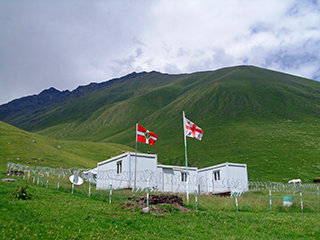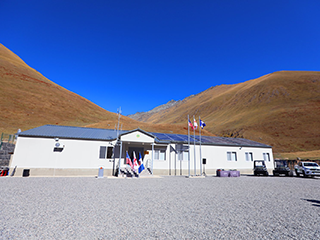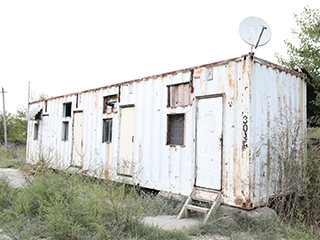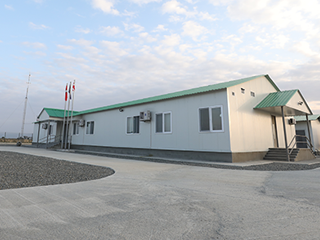Strategic cooperation between the U.S. and Georgia in the field of border security is aimed at strengthening peace and stability in the country and the region. Cooperation between the countries is based on the principle of mutual support. Given the threats and challenges in the region and the country, the U.S. and Georgian governments are working closely to develop border protection capabilities, enhance Euro-Atlantic integration, ensure effective export controls, establish international standards for non-proliferation of weapons of mass destruction, provide expert assistance and support border guards’ professional development.
In 2020-2021, with the assistance of various U.S. Government programmes, the U.S. Defense Threat Reduction Agency (DTRA) and the U.S. Export Control and Related Border Security Program (EXBS), the infrastructure at five Land Border Sectors was renewed, Border Sectors were equipped with border incident detection and response capabilities, as well as signal and communications devices.
With the support of the U.S. Government, the Black Sea Maritime Domain Awareness (MDA) is underway. The initiative includes two phases: phase I – the replacement of Coast Guard Radar Stations’ radars with modern radars and equipping them with video surveillance (video cameras) and radio communications systems. Phase II - upgrading radar and communication equipment on floating vessels, as well as setting up a video monitoring (video cameras) system.
To improve the Border Police capacity, an Integrated Border Management project is underway within the framework of the EU4 Security, Accountability and Fight against Crime in Georgia (SAFE) programme. The project is implemented by the International Organization for Migration (IOM). Within the framework of the project, the Georgian Border Police was equipped with border incident response, signal and communications devices. Within the framework of this project, four “Defender” type modern Patrol Fast Response Boat was transferred to the Georgian Coast Guard Department (with financial support of European Union and with the coordination of IOM). Also, in the framework of this project an electronic surveillance system at two Land Border Protection Sectors was arranged and also, Distance Learning System was established at Border Sectors.
 |
|
 |
|
 |
|
 |
| SECTOR JUTA BEFORE AND AFTER |
|
SECTOR LEKISKURE BEFORE AND AFTER |
COOPERATION WITH THE NORTH ATLANTIC TREATY ORGANIZATIONIn the framework of NATO-Georgia cooperation, the Border Police is actively involved in the development of the following important documents: NATO Annual National Programme (ANP); NATO Planning and Review Process Document (PARP); NATO Military Committee and Georgia Military Work Plan (MC + GEO WP); Substantial NATO-Georgia Package (SNGP), which includes the Maritime Security Initiative, and is aimed at strengthening the Border Police Coast Guard capabilities and responds to NATO's stated goal of ensuring Black Sea security and practical cooperation with Georgia in this process. The project is led by Latvian and Georgian experts (representative of the Border Police Coast Guard Department), who are coordinating the implementation of the initiative.
The Border Police work closely with the Allied Maritime Command (MARCOM). As part of this cooperation, the Border Police has been sending a Liaison Officer to MARCOM Headquarters since 2014 to facilitate the exchange of information and further deepen the existing bilateral relations. The activities of the Liaison Officer are regulated based on Memoranda of Understanding signed with MARCOM, the updated version of which was signed on July 27, 2020.
Twice a year, the Border Police hosts the operational units of the NATO Allied Maritime Command (MARCOM) in the Georgian territorial waters. These visits are a practical example of the successful cooperation between NATO and Georgia on Black Sea security issues and confirmation of NATO’s support to Georgia.
Boarding Teams (Tactical Units) of the Georgian Coast Guard successfully accomplished NATO OCC E&F evaluation 4 year process, which paved the way to Georgia's Operational partner status to NATO-led maritime security operation ''Sea Guardian''. The North Atlantic Council (NAC) made the positive decision and Georgia has been granted Operational Partner Status to the Operational Sea Guardian (OSG).
COOPERATION WITH THE EUROPEAN BORDER AND COAST GUARD AGENCYOn February 11, 2021, the Minister of Internal Affairs of Georgia, Vakhtang Gomelauri, and the Executive Director of the European Border and Coast Guard Agency (FRONTEX), Fabrice Leggeri, signed a new working agreement on operational cooperation. The agreement replaced the document signed between the parties in 2008 and defined new directions of the partnership. The main areas of cooperation, between the agencies, are border management, the fight against illegal migration and cross-border crime.








